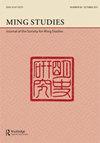A Conversation With Harriet Zurndorfer
IF 0.3
0 ASIAN STUDIES
引用次数: 0
Abstract
HTZ: I see myself in the first place as a social historian, and if you want to understand the development of Chinese society as a whole, then the Ming dynasty is crucial. When I started my studies at Berkeley under Fred Wakeman, my plan was to focus on the Song dynasty, on a project I provisionally entitled ‘Song manors and Song manners’. The Naito Konan thesis was still very influential, and scholars wanted to investigate the Song dynasty as it was considered to be the start of the ‘modern era’ in China. Wakeman suggested I spend time in Cambridge, England, to work with Denis Twitchett, and from there I went to Japan to study with Shiba Yoshinobu. At that time, Braudel’s publications and the Annales school were very influential. At Berkeley, as in Japan, scholars were approaching China’s past by looking at the longue durée. Instead of working within what was then considered the older dynastic model, scholars were beginning to regard historical change over the long period from 1500 to the present. Shiba was already examining the longue durée in Huizhou, and so I left behind the idea of concentrating on the Song dynasty, and started to contemplate broader patterns of historical change that included the Ming dynasty. In that context, working within a single dynasty did not seem to offer the opportunities that the long-term perspective could bring. At the same time, scholars were gradually moving away from the Marxist approach. Of course, studies continued to appear with an emphasis on Marxist analysis; Mi Chu Wiens, for example, used a Marxist model for her analysis of landholding in the Jiangnan region. But gradually, other approaches, other social science models, and thus other periodizations started to appear. Shiba Yoshinobu showed the importance of having a more open approach to studying the past. I should also add that at that time, in the mid-1970s, I fell under the spell of the idea of l’histoire immobile and the work of the French scholar Le Roy Ladurie, who was helping to crush Marxist reverence in the academy.哈丽特·祖恩多弗的谈话
汉茨:我认为自己首先是一个社会历史学家,如果你想了解整个中国社会的发展,那么明朝是至关重要的。当我开始在伯克利师从弗雷德·韦克曼(Fred Wakeman)时,我的计划是专注于宋代,我暂时把这个项目命名为“宋代庄园和宋代礼仪”。内藤柯南的论文仍然非常有影响力,学者们想要调查宋朝,因为它被认为是中国“现代时代”的开端。韦科曼建议我在英国剑桥和丹尼斯·特威切特(Denis Twitchett)一起工作,从那里我去了日本,师从吉信柴巴(Shiba Yoshinobu)。当时,布罗代尔的出版物和年鉴学派都很有影响力。在伯克利,就像在日本一样,学者们通过观察漫长的时间跨度来研究中国的过去。学者们开始考虑从1500年到现在的漫长时期的历史变化,而不是在当时被认为是旧王朝模式的范围内进行研究。Shiba已经在研究徽州的长时期,所以我放弃了专注于宋代的想法,开始思考包括明朝在内的更广泛的历史变化模式。在这种背景下,在一个王朝内工作似乎并没有提供长期前景所能带来的机会。与此同时,学者们逐渐远离马克思主义的方法。当然,继续出现了强调马克思主义分析的研究;例如,Mi Chu Wiens使用马克思主义模型来分析江南地区的土地持有情况。但是渐渐地,其他的方法,其他的社会科学模型,以及其他的分期开始出现。柴巴吉信展示了以更开放的方式研究过去的重要性。我还应该补充一点,在那个时候,在20世纪70年代中期,我被“静止的历史”的思想和法国学者勒罗伊·拉杜里(Le Roy Ladurie)的工作迷住了,拉杜里正在帮助粉碎学术界对马克思主义的崇敬。
本文章由计算机程序翻译,如有差异,请以英文原文为准。
求助全文
约1分钟内获得全文
求助全文

 求助内容:
求助内容: 应助结果提醒方式:
应助结果提醒方式:


